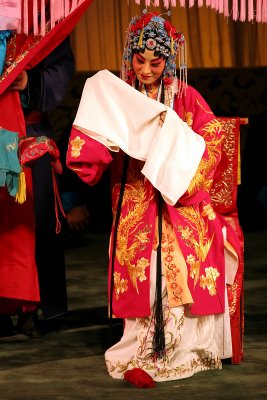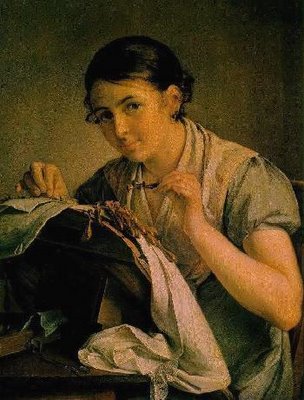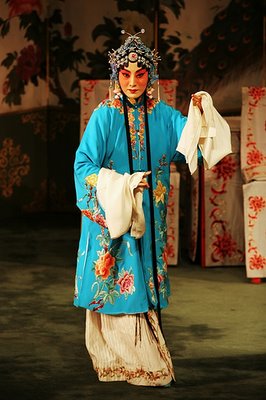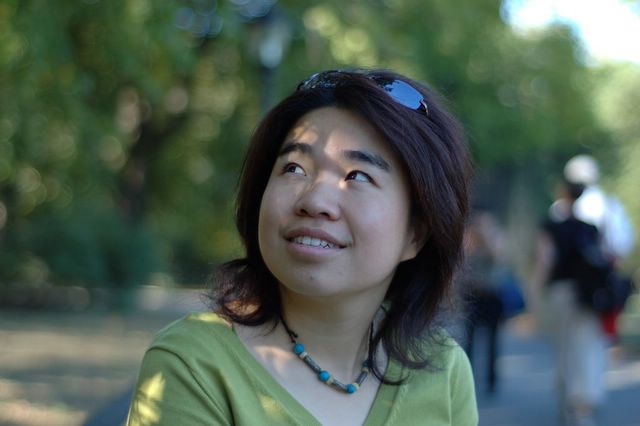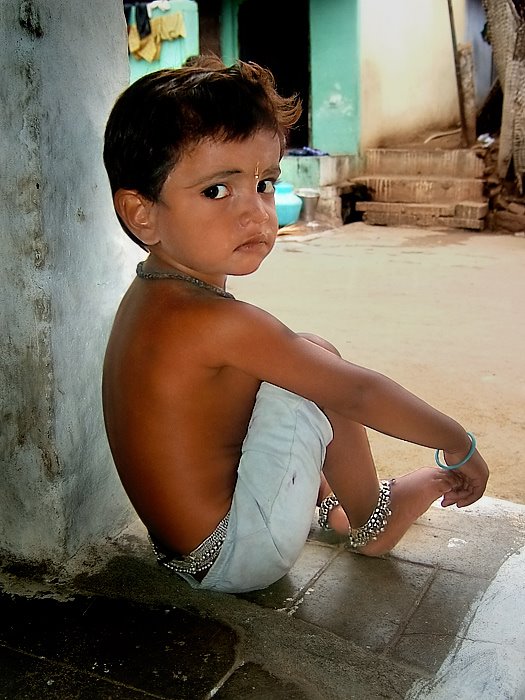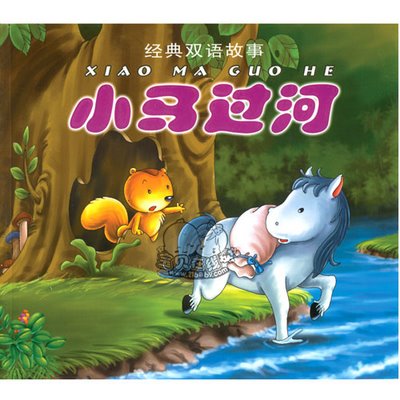
2006年11月11日星期六
我是小马想过河

选自《狐狸啊,你干啥呢》
2006年11月9日星期四
Madam Butterfly
 I went to see Madam Butterfly at Met Opera. It is a new co-production between The Metropolitan Opera, English National Opera and the Lithuanian National Opera. "Stage and film director Anthony Minghella (The English Patient) presents Butterfly as a Japanese play, complete with Bunraku-style puppets (by Blind Summit Theatre) and translucent Shoji screens designed by Michael Levine. Han Feng’s costumes are a riot of color and Carolyn Choa’s choreography explores the boundaries between East and West" (http://www.metoperafamily.org/metopera/season/production.aspx?id=8881).
I went to see Madam Butterfly at Met Opera. It is a new co-production between The Metropolitan Opera, English National Opera and the Lithuanian National Opera. "Stage and film director Anthony Minghella (The English Patient) presents Butterfly as a Japanese play, complete with Bunraku-style puppets (by Blind Summit Theatre) and translucent Shoji screens designed by Michael Levine. Han Feng’s costumes are a riot of color and Carolyn Choa’s choreography explores the boundaries between East and West" (http://www.metoperafamily.org/metopera/season/production.aspx?id=8881).

According to wikipedia: "Madama Butterfly (Madame Butterfly) is an opera in three acts (originally two acts) by Giacomo Puccini to an Italian libretto by Luigi Illica and Giuseppe Giacosa. The opera was based on a short story by John Luther Long which was made into a play by David Belasco. " The story is said to focus the conflict of culture, the western and eastern values and the idea of love. Butterfly is portraited as an innoscent womon who put love above her respect for her religion and tradition. There are several occasions she refuses to refer herself as Japanese, but eventually she is abondended as a Japanese wife. The play is created 100 years ago and it speaks to the process of globalization and global conflicts accompany the process. Butterfly's contradictory feelings about her American husband represent the feelings of most developing countries for the developed countries. It is not only about a woman's fate who falls in love with western culture, it is also about a nation's fate when it encounters a powerful external culture. I think the most extraordinary part of the opera is its stage design and use of the traditional Japanese theatrical techniques and way of performance, such as Bunraku-style puppets and dancers as floating instrument. In the end of the first act, Butterfly and Pinkerton sang a duet in the garden. But on stage, there is no garden. The group of dancers hold paper latterns instead, moving back and forth to create this invisible garden on the stage. The moving of the latterns creates an illusion of river of stars on the sky and the changing emotions of the loving couple. In the start of the last act, the dancers appears. One of them wears Pinkerton's jacket and he plays the Pinkerton in Butterfly's dream. In her dream, Pinkerton returns from abroad and finds his son in such a joy. The silent dance sequence is very beautiful and the performer actually dances with the puppet which represents Butterfly's son ("today his name is sorrow; but tomorrow his name is joy"). When Butterfly decides to die, the stage becomes dark and she is wearing her wedding gown. After she stabs herself, two dancers come in and pull the red silk belt on her back. The red belt becomes streams of blood all over the stage. I can not help crying, it is just too much! Madam Butterfly is a much simple work than Aida. But because of its simplicity, it provides the artists a lot of space to put into their ideas. The stage design, the light design, and the Choreographer are perfectly put together--not to take you away from the opera, but to make it a holistic work. The opera almost generates the same feeling as achieved by many of great traditional Japanese poetry--a sad happiness in a floating world. BTW, 我们在大都会歌剧院门口看到了张艺谋。身穿黑衣,缠着两圈儿红围脖,跟一般来看戏的老百姓一样。中国的名人到了纽约活得真自在,难怪都爱来这儿呢。
逃会

2006年11月8日星期三
Ching Ching Cha

 mprimising its idea. Maybe that is one of amazing thing about belief!
mprimising its idea. Maybe that is one of amazing thing about belief! 2006年10月30日星期一
Literature and Citizenship: A Conversation with Arthur Danto and Orhan Pamuk
"Literature and Citizenship" is part of the Havel at Columbia program sponsored by the Columbia University Arts Initiative.
Arthur Danto is Johnsonian Professor Emeritus Philosopy at Columbia University. Professor Danto has been with Columbia since 1951, a professor since 1966. He has been the recipient of many fellowships and grants including two Guggenheims, ACLS, and Fulbright. Professor Danto has served as Vice-President and President of the American Philosophical Association, as well as President of the American Society for Aesthetics. He is the author of numerous books, including Nietzsche as Philosopher, Mysticism and Morality, The Transfiguration of the Commonplace, Narration and Knowledge, Connections to the World: The Basic Concepts of Philosophy, and Encounters and Reflections: Art in the Historical Present, a collection of art criticism which won the National Book Critics Circle Prize for Criticism, 1990. His most recent book is Embodied Meanings: Critical Essays and Aesthetic Meditations. Art critic for The Nation, he has also published numerous articles in other journals. In addition, he is an editor of the Journal of Philosophy and consulting editor for various other publications.
Orhan Pamuk, the internationally acclaimed Turkish novelist and memoirist, won the 2006 Nobel Prize for Literature.
Mr. Pamuk is a Fellow with Columbia University’s Committee on Global Thought and will hold an appointment in Middle East and Asian Languages and Cultures and at the School of the Arts. His work has been translated into more than 40 languages and he has received numerous prestigious international prizes, including Le Prix Mediterranee etranger, the Prix Medicis, the Ricarda Huch Prize, and honorary membership in the American Academy of Arts and Letters. A native of Istanbul, Mr. Pamuk was also a visiting scholar at Columbia University from 1985 to 1988.
| Date: | Thursday, November 2nd, 7:30 p.m. |
| Location: | Miller Theater |
| Contact: | Members of the Press who wish to attend this event should contact Anne Burt at 212-854-7884 or ab2673@columbia.edu |
| Reservations: | Tickets are free but reservations are required: http://havel.columbia.edu/literature.html |
2006年10月29日星期日
Haunted House
2006年10月28日星期六
去时陌上花如锦,今朝楼头柳又青
